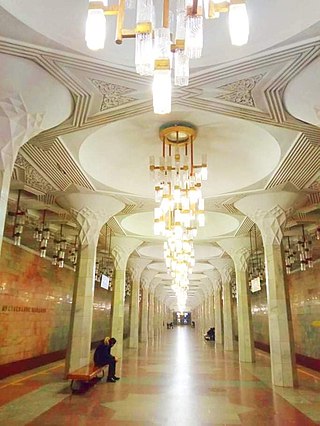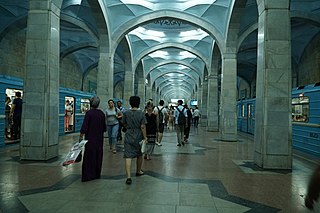
The Tashkent Metro is the rapid transit system serving the city of Tashkent, the capital of Uzbekistan. It was the seventh metro to be built in the former USSR, opening in 1977, and the first metro in Central Asia. Each station is designed around a particular theme, often reflected in the station name.

The Tashkent–Bukhara high-speed rail line is a 600-kilometre (373 mi) high-speed rail connection between Tashkent and Bukhara, two major cities in Uzbekistan. The route passes through six regions: Tashkent, Sirdaryo, Jizzakh, Samarqand, Navoiy, and Bukhara in Uzbekistan. Trains operate seven days a week under the brand name Afrosiyob. The line originally ran from Tashkent to Samarqand, but an extension to Bukhara went into operation on 25 August 2016. Travel from Tashkent to Bukhara, a distance of 600 km (373 mi), now takes 3 hours and 20 minutes instead of 7 hours.

Pushkin is a station of the Tashkent Metro on Chilonzor Line. This station is named after poet Alexander Pushkin. It was opened on 18 August 1980 as part of the second section of Chilonzor Line, between October inkilobi and Maksim Gor'kiy.

Hamid Olimjon is a station of the Tashkent Metro on Chilonzor Line. This station is named after poet Hamid Olimjon. The station vault type with two underground vestibules. It was opened on 18 August 1980 as part of the second section of Chilonzor Line, between October inkilobi and Maksim Gor'kiy.

Amir Temur Xiyoboni is a station of the Tashkent Metro on Chilonzor Line. It is a transfer station to Yunus Rajabiy, Yunusobod Line. The station is named for the square of Amir Timur.

Mustaqillik Maydoni is a station of the Tashkent Metro on Chilonzor Line. The station was opened on 6 November 1977 as part of the inaugural section of Tashkent Metro, between October inkilobi and Sabir Rakhimov. Prior to 1 November 1991 the name of the station was "V. I. Lenin Maidoni".

Olmazor is a station of the Tashkent Metro on Chilonzor Line. It is located between Chilonzor and Bekat-1.

Chorsu is a station of the Tashkent Metro on Oʻzbekiston Line. The station was opened on 6 November 1989 as part of the extension of the line between Alisher Navoiy and Chorsu Bazaar. On 30 April 1991 the line was extended to Beruniy.

Gafur Gulom is a station of the Tashkent Metro on Oʻzbekiston Line. The station was opened on 6 November 1989 as part of the extension of the line between Alisher Navoiy and Chorsu. It is named after Gafur Gulom, an Uzbek poet, writer and translator. The station was decorated by artist S. Sultonmuradov. To finish the station used marble, granite, metal, glass, composition of artistic ceramics. Columns supporting a set of stations have many faces, the upper part of the column is thickened. Illuminating station lights hidden in the domes.

Alisher Navoiy is a station of the Tashkent Metro on Oʻzbekiston Line. The station was opened on 8 December 1984 as the western terminus of the inaugural section of the line, between Alisher Navoiy and Toshkent. On 6 November 1989 the line was extended to Chorsu. It is named after Alisher Navoiy. The station column type with underground and ground-based lobby. Transfer to the station Paxtakor of Chilonzor Line is available.

O'zbekiston is a station of the Tashkent Metro on Oʻzbekiston Line. It was opened on 8 December 1984 as part of the inaugural section of the line, between Alisher Navoiy and Toshkent. The station is one of the vaulted type with two underground vestibules. The station is located lamps, which are made of glass and metal in the form of a cotton boll to disclose. On the walls in the enameled ceramics shown for water, and the ceiling is decorated with ganch. At furnish used marble, granite, ceramics, ganch, metal, glass and other materials.

Oybek or Aybek is a station of the Tashkent Metro on Oʻzbekiston Line. The station was opened on 8 December 1984 as part of the inaugural section of the line, between Alisher Navoiy and Toshkent. It is named in honor of the poet Musa Tashmukhamedov. For the first time in Tashkent underground at this station applied column-type platform using earthquake-resistant monolithic structures. Columns station covered with reddish marble and decorated with a ceramic ornament. On the side walls of the stairs that go down to the platform, decorated with panels on the theme based on the works of Oybek as book pages. On one of them depicts the writer. When finishing the station it is widely used in marble, granite, ceramics and other materials.

Toshkent is a station of the Tashkent Metro on Oʻzbekiston Line. The station was opened on 8 December 1984 as the eastern terminus of the inaugural section of the line, between Alisher Navoiy and Toshkent. On 6 November 1987 the line was extended to Chkalov. It serves Tashkent's main-line railway station. Column-type station with two underground vestibules. Located beneath the forecourt. Decoration of the walls and ceiling like the head of the column and made in the traditional national spirit, in the stair descents on a platform made of the image, dedicated to the 2200th anniversary of Tashkent and on "Tashkent - a city of peace and friendship," here emblem of the city. When finishing the station it is widely used in marble, granite, ceramics, metal, glass and other materials.

Mashinasozlar is a station of the Tashkent Metro on Oʻzbekiston Line. The station was opened on 6 November 1987 as part of the extension of the line from Toshkent to Chkalov. Architectural and artistic design of the station is made columns and precast concrete structures. Columns and ceiling of the hall are decorated with reddish-green marble Syon-Shusha. Floors platform halls, vestibules and underground passages are covered with granite.
Ming Orik is a station of the Tashkent Metro on Yunusobod Line. It was opened on 24 October 2001 as part of the inaugural section of the line, between Ming Orik and Habib Abdullayev. There is transfer to Oybek station of the Oʻzbekiston Line.

Shahriston is a station of the Tashkent Metro on Yunusobod Line. It was opened on 24 October 2001 as part of the inaugural section of the line, between Ming Orik and Habib Abdullayev. Previously it was called Habib Abdullayev. On June 16, 2015 the station was renamed to "Shahristan" according to the decision of hakim (mayor) Tashkent. The station served the northern terminus of the line until 29 August 2020, when the line was extended north to Turkiston.
Novza is a station of the Tashkent Metro on Chilonzor Line. The station was opened on 6 November 1977 as part of the inaugural section of Tashkent Metro, between October inkilobi and Sabir Rakhimov. Previously it was called Hamza. June 16, 2015 was renamed the station "Novza" according to the decision of hakim (mayor) Tashkent.

Doʻstlik or Dustlik is a station of the Tashkent Metro on the Oʻzbekiston Line. The station was opened on 6 November 1987 as the eastern terminus of the extension of the line from Toshkent. In 2012 the station's name was changed from Chkalov to Dustlik.

Xalqlar Doʻstligi is a station of the Tashkent Metro on Chilonzor Line. The station was opened on 6 November 1977 as part of the inaugural section of Tashkent Metro, between October inkilobi and Sabir Rakhimov. The station is column type with underground and ground-based lobby.
Oʻzgarish is a station of the Tashkent Metro on Chilonzor Line. It was put into operation on December 26, 2020, as part of the third section of the Chilanzar line, between Olmazor and Chinor. The station is located between Choshtepa and Sirgʻali.

















